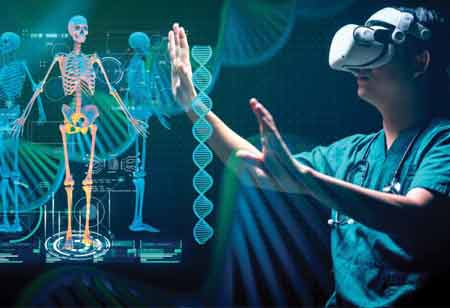Thank you for Subscribing to Healthcare Business Review Weekly Brief

The Next Wave of Innovation in Healthcare Education
Healthcare Business Review
Matthias Schmidt is a digital-savvy business leader with over 15 years of experience driving digital transformation and change initiatives. He specializes in building next-generation learning ecosystems and has worked with multinational organizations across Europe, the USA, and Asia. Matthias holds two master’s degrees and is pursuing a doctorate at the University of Pennsylvania, focusing on the adoption of Generative AI among clinicians and its potential to revolutionize healthcare education and practice. His professional background includes leadership roles in strategy consulting, corporate development, and education design, particularly in the healthcare sector
This article is based on an interview with Matthias Schmidt, head of education design at AO Foundation.
A Career at the Intersection of Healthcare, Education and Technology
My passion for revolutionizing healthcare learning through innovation has fueled my journey. With a background in strategy, technology and education, I have spearheaded programs that harness cutting-edge technologies and educational methodologies to equip healthcare professionals with the skills needed to excel in the rapidly evolving medical landscape. My doctoral thesis on the adoption of generative AI among orthopedic surgeons has further reinforced my belief in the transformative power of technology and its potential to positively impact patient outcomes.
The findings from my research underscore the importance of understanding the complex interplay of individual, technological, and organizational factors in shaping the successful integration of AI technologies in healthcare education. While the studied clinicians demonstrate positive attitudes toward the potential of generative AI, their actual adoption remains in the early stages. This gap highlights the need for targeted strategies that address critical adoption factors.
Emerging Technologies Reshaping the Healthcare Education Landscape
The healthcare education sector is undergoing tectonic shifts, propelled by the integration of advanced technologies such as artificial intelligence (AI), virtual reality (VR), and simulation-based learning tools. These innovations transform learning into a more immersive, interactive, and effective experience. Learners can now practice complex procedures in risk-free virtual environments and gain a deeper understanding of human anatomy through 3D visualization. The move toward digital platforms has also paved the way for personalized learning experiences that adapt in real-time to individual learner needs, ensuring more efficient use of resources and improved outcomes for healthcare organizations. However, the successful integration of these technologies requires a lot of proactivity in addressing identified challenges, such as the need for robust validation processes, clear ethical guidelines, and the development of technology literacy among healthcare professionals.
Future of Healthcare Education
I envision a future where healthcare education seamlessly integrates with a broader learning ecosystem, making learning more accessible, efficient, and tailored to individual needs. As AI plays an increasingly pivotal role in various aspects of healthcare, from diagnosis to treatment planning, curricula will need to evolve to include not only domain-specific knowledge but also proficiency in interpreting and collaborating with AI tools.
Healthcare leaders must invest in the necessary infrastructure, talent, and governance frameworks to support these advancements while fostering a culture of innovation and adaptability.
Advice for Healthcare Leaders and the Next Generation of Professionals
For healthcare leaders and educators, staying at the forefront of technological trends and understanding their potential impact on healthcare education is crucial. Fostering a learning environment that encourages experimentation, iteration, and continuous improvement will be key to driving educational innovation in the face of rapid technological advancements. It is essential to prioritize the development of digital literacy skills among faculty and learners, ensuring that they are equipped to navigate the complexities of technology-enhanced learning environments.
For the next generation of healthcare professionals, cultivating a mindset of lifelong learning and adaptability will be indispensable
For the next generation of healthcare professionals, cultivating a mindset of lifelong learning and adaptability will be indispensable. As the healthcare landscape continues to evolve, those who are versatile and eager to embrace new technologies and educational approaches will be well-positioned to thrive in an increasingly complex and dynamic environment. It is important to actively seek out opportunities for interprofessional collaboration and engage in the co-creation of educational initiatives that leverage the collective expertise of diverse stakeholders.
As someone who has been involved in the development and implementation of technology-enhanced educational programs, I cannot stress enough the importance of grounding innovation in the principles of human-centered design and evidence-based practice. By placing learners' needs, experiences, and aspirations at the core of our educational interventions, we can create meaningful and impactful learning experiences that drive positive change in healthcare delivery.









